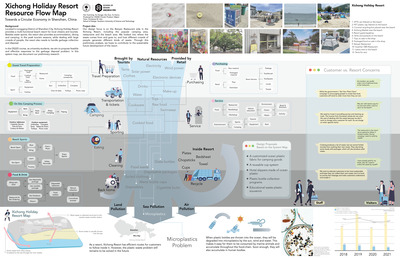Xichong Holiday Resort Resource Flow Map: Towards a circular economy in Shenzhen, China
Qiu, Guo, Yu, Hanxu, Hu, Hongyi, Han, Yuanning and Herr, Christiane M. (2022) Xichong Holiday Resort Resource Flow Map: Towards a circular economy in Shenzhen, China. In: Proceedings of Relating Systems Thinking and Design, RSD11, 3-16 Oct 2022, Brighton, United Kingdom.
![RSD11-2_Image_194.png [thumbnail of RSD11-2_Image_194.png]](https://openresearch.ocadu.ca/4574/1.hassmallThumbnailVersion/RSD11-2_Image_194.png)  Preview |
Image
RSD11-2_Image_194.png Available under License Creative Commons Attribution Non-commercial No Derivatives. Download (9MB) | Preview |
Abstract
Located in Longgang District of Shenzhen City, Xichong Holiday Resort offers a multi-functional beach resort for both local citizens and tourists. Besides water sports, the resort provides accommodation, dining and various outdoor activities such as camping. In peak tourist seasons, the resort not only needs to deal with large crowds of people, but it also needs to handle waste collection and disposal.
This systems map documents preliminary research conducted by students in the School of Design, Southern University of Science and Technology. It examines the resort’s current approach to sustainable operation and management and forms the basis for new proposals to help improve it. In response to our findings, we aim to propose feasible and effective responses to the resort’s current waste generation and disposal challenges.
Our research and design focused on the restaurant and beach area of Xichong Resort, including the popular camping area, restaurants and the beach. Based on on-site observations and interviews, we systematically examined where waste comes from and goes to and how different crowds of people generate different kinds of waste. Through this preliminary analysis, we hope to contribute to the sustainable future development of the resort.
One of the biggest problems related to current waste disposal strategies in the resort is the microplastics problem, particularly noticeable on the beach. Local visitors, as well as tourists, carry large amounts of plastic products to the beach. While most are collected after being discarded for disposal in landfills or burnt for power generation, some amount of plastics still washes into the ocean. Much of this waste consists of either plastic bottles or plastic bags. Once plastic bottles are thrown into the ocean, they will degrade into microplastics through the sun, wind and water. This leads to microplastics being consumed by marine animals and eventually accumulating throughout the food chain. Soon enough, they will also accumulate in human bodies.
| Item Type: | Conference/Workshop Item (Poster) |
|---|---|
| Divisions: | Faculty of Design |
| Date Deposited: | 12 Jun 2024 18:11 |
| Last Modified: | 12 Jun 2024 18:11 |
| URI: | https://openresearch.ocadu.ca/id/eprint/4574 |
Actions (login required)
 |
Edit View |

 Tools
Tools Tools
Tools